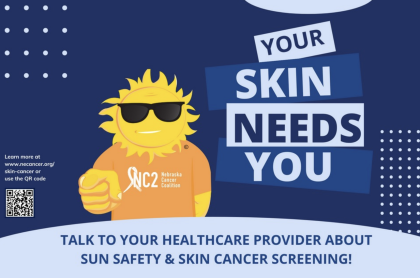
Gothenburg Health partners with Nebraska Cancer Coalition to raises skin cancer awareness
Gothenburg Health in partnership with the Nebraska Cancer Coalition is educating people about the dangers of skin cancer, the most common type of cancer in the United States and the fifth most common in Nebraska. With an estimated 6,620 new cases and 60 deaths anticipated in Nebraska for 2024, they are committed to raising awareness and promoting preventive measures.
According to the American Cancer Society, Nebraska has a higher incidence and mortality rate for melanoma compared to the national average. Gothenburg Health is passionate about addresses these alarming statistics by emphasizing the importance of sun safety and early detection.
The coalition’s educational materials highlight that five or more sunburns can double an individual's risk of developing skin cancer. A concerning 64% of high school students in Nebraska reported experiencing sunburn last year. The majority of melanoma cases are caused by sun exposure, according to the Skin Cancer Foundation and the National Cancer Institute.
To promote sun safety, Gothenburg Health advises seeking shade, wearing protective clothing, and applying SPF 30 or higher sunscreen every two to three hours. Despite these simple precautions, only 37-39% of adults adhere to these guidelines, according to the National Cancer Institute.
Additional sun safety tips include avoiding sun exposure between 10 a.m. and 4 p.m., wearing sunglasses to protect the eyes, and using a hat with a 2- to 3-inch brim to cover the ears, eyes, forehead, nose, and scalp. It is also recommended to keep babies younger than six months out of direct sunlight.
Anyone can get skin cancer, but certain factors increase your risk. These include having a lighter natural skin color, a tendency to burn or freckle easily, blue or green eyes, blond or red hair, a family history of skin cancer, and older age.
Early detection is crucial in the fight against skin cancer. The American Cancer Society reports that when melanoma is found at the local stage, the five-year survival rate is 99%. However, if discovered at a distant stage, the survival rate drops to 35%.
The coalition also educates on the ABCDEs of skin cancer detection: asymmetry, border, color, diameter, and evolution. Any irregularities in these areas should prompt a visit to your health care provider.
For more information on skin cancer prevention and to schedule a skin check with your local provider, call Gothenburg Health at 308-537-3661.






